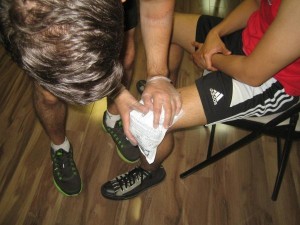Iliotibial band syndrome causes pain brought about by soreness of the band as it moves the lateral condyle of the femur. Once the iliotibial band is irritated, friction might arise while running or walking. This results to knee discomfort due to the inflammation that occurs on the adjacent region of the knee joint.
If the symptoms are left untreated, further inflammation and scarring can manifest in the bursa, resulting to continuous discomfort with reduced activity.
What are the causes?

- Overuse is one of the usual cause, often seen among long-distance runners.
- Mechanical issues such as diminished flexibility and reduced quadriceps muscle strength
- Discrepancies with the leg length
- Abnormal pelvic tilt
- Bow-legged
- Training errors
What are the signs?
Knee pain is the main indication that arises from the inflammation. The discomfort is severe once the heel strikes while walking or running and might radiate from the knee up to the leg and hip. In addition, pain can also be felt if the knee is flexed especially when moving up or down the stairs.
There is also generalized tenderness at the site where the iliotibial band inserts at the knee joint. Some degree of weakness or imbalance is also present in the quadriceps and hamstring muscles. Additionally, the iliotibial band is also taut.
Management of iliotibial band syndrome
The primary treatment for most cases of overuse injuries involves adequate rest, application of ice, elevation and anti-inflammatory medications.
In most instances, the symptoms might manifest during strenuous activity such as running. Alternatives such as swimming or bicycling can be done as the inflammation of the iliotibial band settles.
